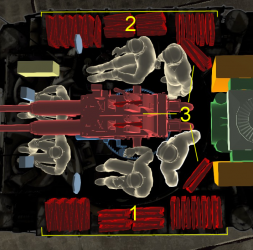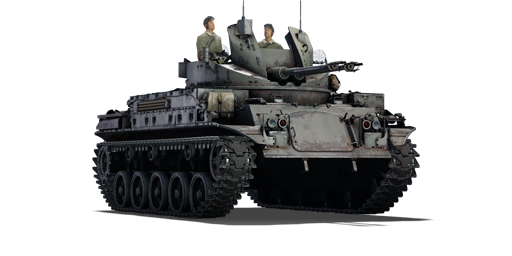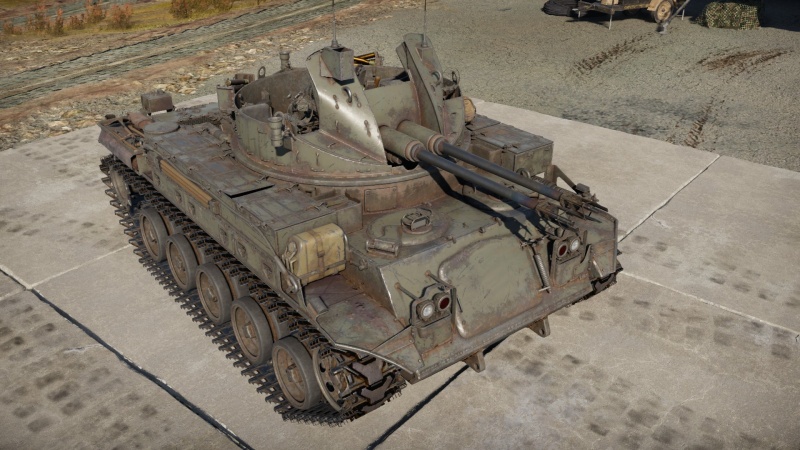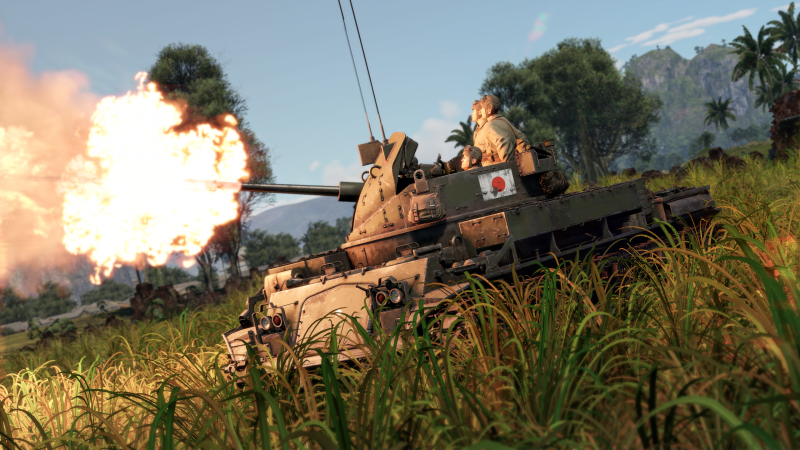Difference between revisions of "M42 (Japan)"
(→Description) |
(→Description) |
||
| Line 14: | Line 14: | ||
== Description == | == Description == | ||
<!-- ''In the description, the first part should be about the history of the creation and combat usage of the vehicle, as well as its key features. In the second part, tell the reader about the ground vehicle in the game. Insert a screenshot of the vehicle, so that if the novice player does not remember the vehicle by name, he will immediately understand what kind of vehicle the article is talking about.'' --> | <!-- ''In the description, the first part should be about the history of the creation and combat usage of the vehicle, as well as its key features. In the second part, tell the reader about the ground vehicle in the game. Insert a screenshot of the vehicle, so that if the novice player does not remember the vehicle by name, he will immediately understand what kind of vehicle the article is talking about.'' --> | ||
| − | The '''{{Specs|name}}''' was purchased by the JSDF to replace the aging [[M19A1 (Japan)]] in the 1960s. While the [[Type 87]] was still in development, | + | The '''{{Specs|name}}''' was purchased by the JSDF to replace the aging [[M19A1 (Japan)]] in the 1960s. While the [[Type 87]] was still in development, only a few models were bought of the M42, due to the high development cost of the Type 87. Even though the Type 87 was adopted in 1987, the M42 stayed in service until 1994 to fill the ranks. |
| − | The {{PAGENAME}} was introduced along with the initial Japanese Ground Forces tree in [[Update 1.65 "Way of the Samurai"]]. It is identical in characteristics as the American [[M42]]. Its two 40 mm Bofors gun and exposed crew make the M42 quite a mediocre anti-aircraft vehicle, with a relatively slow-firing gun that makes it hard to quickly get a hit, and low protection that any aircraft can strafe | + | The {{PAGENAME}} was introduced along with the initial Japanese Ground Forces tree in [[Update 1.65 "Way of the Samurai"]]. It is identical in characteristics as the American [[M42]]. Its two 40 mm Bofors gun and exposed crew make the M42 quite a mediocre anti-aircraft vehicle, with a relatively slow-firing gun that makes it hard to quickly get a hit, and low protection that any aircraft can strafe to pieces. However, this SPAA is quite fast and can relocate and get to a different position quite quickly. |
== General info == | == General info == | ||
Revision as of 23:19, 31 March 2023
| This page is about the SPAA M42 (Japan). For other usages, see M42 (Disambiguation). For other vehicles of the family, see M42 (Family). |
Contents
Description
The Twin 40 mm Self-Propelled Gun M42 Duster was purchased by the JSDF to replace the aging M19A1 (Japan) in the 1960s. While the Type 87 was still in development, only a few models were bought of the M42, due to the high development cost of the Type 87. Even though the Type 87 was adopted in 1987, the M42 stayed in service until 1994 to fill the ranks.
The M42 (Japan) was introduced along with the initial Japanese Ground Forces tree in Update 1.65 "Way of the Samurai". It is identical in characteristics as the American M42. Its two 40 mm Bofors gun and exposed crew make the M42 quite a mediocre anti-aircraft vehicle, with a relatively slow-firing gun that makes it hard to quickly get a hit, and low protection that any aircraft can strafe to pieces. However, this SPAA is quite fast and can relocate and get to a different position quite quickly.
General info
Survivability and armour
Armour may as well be non-existent on the M42. Built off the chassis of the M41 Walker Bulldog, the SPAA can be penetrated by anything in the game, except for those few tanks armed with only machine guns, of course. In this tank, speed is your armour. A stationary Duster is a scrapped Duster unless you're firing on an aircraft, in which you should stop behind some cover.
Armour type:
- Rolled homogeneous armour
| Armour | Front (Slope angle) | Sides | Rear | Roof |
|---|---|---|---|---|
| Hull | 12.7 mm (33°) Front glacis 25.7 mm (39°) Bottom glacis |
12.7 mm | 12.7 mm Top 19 mm Bottom |
12.7 mm |
| Turret | 12.7 mm | 8 mm | 8 mm | N/A |
Notes:
- Suspension wheels and tracks are 15 mm thick.
Mobility
| Game Mode | Max Speed (km/h) | Weight (tons) | Engine power (horsepower) | Power-to-weight ratio (hp/ton) | |||
|---|---|---|---|---|---|---|---|
| Forward | Reverse | Stock | Upgraded | Stock | Upgraded | ||
| Arcade | 79 | 21 | 22.5 | 710 | 954 | 31.56 | 42.4 |
| Realistic | 73 | 19 | 442 | 500 | 19.64 | 22.22 | |
This tank can go about 72 km/h forwards and -20 km/h backwards. Either way, it's fast. Being built with neutral steering and lighter than the M41A1. It should take no difficulty to get out of a situation in a pinch.
Modifications and economy
Armaments
Main armament
The M42 Duster is armed with two 40 mm anti-aircraft guns. They have a decent rate of fire and you will seldom have to stop and wait for a reload - more likely, you'll have to wait for the gun barrel to cool down. Against aircraft, these guns are deadly. A shot or two will be more than enough to shoot down an enemy. They are also quite deadly against lightly armoured vehicles, such as enemy SPAAs or light tanks such as the Spähpanzer Ru 251 or M41 Walker Bulldog, and you can penetrate the side of Panthers, too. However, they require direct hits. Against the Soviet heavy or British medium tanks you are likely to encounter, however these guns will do nothing for you. You will rarely get an opportunity to use the Bofors on another tank, as they simply lack the penetration to do so - 72 mm doesn't get you very far at Rank IV. It's part of what makes the Rank IV Japanese experience so painful. If you can get the guns to hit, you should have no trouble knocking aircraft out of the sky.
| 40 mm Dual Automatic Gun M2 (x2) | Turret rotation speed (°/s) | Reloading rate (seconds) | ||||||||||||
|---|---|---|---|---|---|---|---|---|---|---|---|---|---|---|
| Mode | Capacity (Belt) | Fire rate | Vertical | Horizontal | Stabilizer | Stock | Upgraded | Full | Expert | Aced | Stock | Full | Expert | Aced |
| Arcade | 480 (8) | 120 | -3°/+85° | ±180° | N/A | 35.22 | 48.75 | 59.20 | 65.47 | 69.65 | 0.65 | 0.58 | 0.53 | 0.50 |
| Realistic | 23.80 | 28.00 | 34.00 | 37.60 | 40.00 | |||||||||
Ammunition
- Default: AP-T · FI-T* - These work fine, a hit on an aircraft means instant disassembly for it and still is able to hurt ground vehicles, especially if it is side into the side of a enemy tank.
- Mk.II: FI-T* - These mean bad news for aircraft, what should be used for AA work.
- M81A1: AP-T - These are the worst belts against airplanes. However, they are able to hurt ground vehicles especially if shot into the side of an enemy tank. If you plan on penetrating tanks, load this and flank, since side shots are almost a necessity.
| Penetration statistics | |||||||
|---|---|---|---|---|---|---|---|
| Ammunition | Type of warhead |
Penetration @ 0° Angle of Attack (mm) | |||||
| 10 m | 100 m | 500 m | 1,000 m | 1,500 m | 2,000 m | ||
| Mk.II | FI-T* | 9 | 8 | 7 | 6 | 5 | 4 |
| M81A1 | AP-T | 72 | 69 | 58 | 46 | 37 | 29 |
| Shell details | ||||||||||||
|---|---|---|---|---|---|---|---|---|---|---|---|---|
| Ammunition | Type of warhead |
Velocity (m/s) |
Projectile mass (kg) |
Fuse delay (m) |
Fuse sensitivity (mm) |
Explosive mass (TNT equivalent) (g) |
Ricochet | |||||
| 0% | 50% | 100% | ||||||||||
| Mk.II | FI-T* | 874 | 0.83 | 0.1 | 0.1 | 63 | 79° | 80° | 81° | |||
| M81A1 | AP-T | 875 | 0.88 | - | - | - | 47° | 60° | 65° | |||
Ammo racks

| Full ammo |
1st rack empty |
2nd rack empty |
3rd rack empty |
4th rack empty |
Visual discrepancy |
|---|---|---|---|---|---|
| 60 | 50 (+10) | 38 (+22) | 14 (+46) | 2 (+58) | Yes |
Usage in battles
This tank has no armour, but a lot of speed and guns that do nothing against anything with actual armour. Refrain from attacking enemies that can take a hit from you, unless you like getting "Hit +10SL +5RP". You can roam around the battlefield with your insane speed and act as a scout. Ironically, shooting enemies you know will bounce, you have a reason for it because it makes them show up on the mini-map for all players to see, although it will also expose you. However, you could stay with your teammates and shoot down planes that will be harassing them - they will see you, with your open-top and exposed crew, and think of you as an easy target. They know the danger of the Bofors guns but for some pilots that is a gamble, they are willing to take. A good way to lure planes toward you is the act like you don't see them - shoot off at some distant (ground) target, at which the plane will notice you are "distracted" and dive to attack you, where you can show them the error of their ways in the form of the 40 mm Bofors cannon.
Pros and cons
Pros:
- 40 mm cannons are devastating to planes
- AP rounds able to penetrate roughly 60 mm can be used against some tanks' side armour it could face, like the M4, T-34-85 or Panther A/D
- Unsynchronized firing helps improve overall fire rate
- Outside from default belts, the other belt options are made of a single type of shell that can be relied on
- Relatively fast vehicle with good mobility due to the M41A1 light tank basis
- Fast turret traverse rate helps track aircraft
Cons:
- Despite 40 mm cannons and the unsynchronized firing, the overall fire rate is still lower than its contemporaries
- 40 mm AP rounds are not the best AP rounds to use overall due to relatively low penetration; cannot penetrate all-round protected heavy tanks like the IS-2 or Tiger H1/E
- Open turret allows aerial attacks and machine guns to decimate the exposed crew
- Very thin armour hull, can be penetrated by .50 cal found on the M4
- Is hull-breakable
- Careless driving can damage the vehicle
- Ammo can be used up rather quickly due to the dual-gun firing, prolonged combat can find the ammo stowage run empty
- Easily ammo-racked due to racks scattered all around the turret, aerial autocannons could set it off if hit
History
Development
During late World War II and the Korean War, the US Army were using the Twin Gun Motor Carriage M19 as their main armoured forces anti-aircraft gun. However, during the Korean War, the US Army decided to phase out their M24 Chaffees and its variants, M19 included, in order to implement newer designs made in the time period. One of these newer designs was the development of the M41 Walker Bulldog light tank. The 40 mm armament on the M19 was deemed effective enough to continue usage past the M19, so the turret of the M19 with the twin 40 mm cannons was taken off the chassis and modified to fit the chassis of the M41 light tank, which had a larger turret ring than the M24 Chaffee. This instalment of the anti-aircraft armament onto the M41 light tank was designated as the M42. Production of the vehicle began in early 1952 at the General Motors Cleveland Tank Plant and entered service in 1953, replacing the many other self-propelled anti-aircraft vehicles the army was fielding. Production continued from 1952 to December 1959, ending with a total number of 3,700 units. During the production, the M42 was upgraded in 1956 with a new engine and other upgrades common with the M41 light tank, this upgraded variant was the M42A1.
Japanese Service
The JGSDF purchased 22 M42's in 1960 to replace the 35 M19s which were quickly starting to become outdated. The few models purchased by the Japanese defense force is explained by the high development price of the to become Type 87 SPAAG.
Even after the Type 87 was adopted in 1987 within the JGSDF, the M42 remained in service long after until March 1994.
Media
- Skins
See also
Links to the articles on the War Thunder Wiki that you think will be useful for the reader, for example:
- reference to the series of the vehicles;
- links to approximate analogues of other nations and research trees.
External links
Paste links to sources and external resources, such as:
- topic on the official game forum;
- other literature.
| Japan anti-aircraft vehicles | |
|---|---|
| Ke-Ni Derivatives | Ta-Se · So-Ki |
| Wheeled | Type 94 |
| Tracked | SUB-I-II |
| Radar SPAAG | Type 87 |
| Missile SPAA | Type 93 · Type 81 (C) |
| USA | ▅M16 MGMC · ▅M19A1 · ▅M42 |






